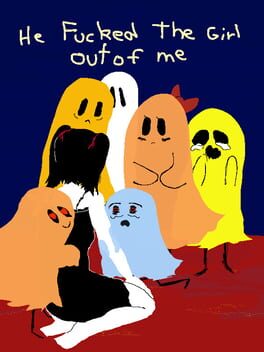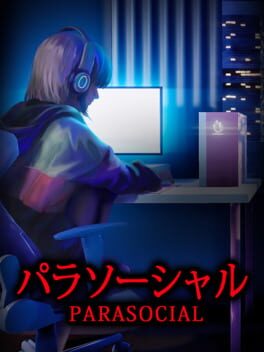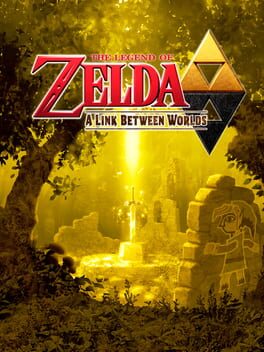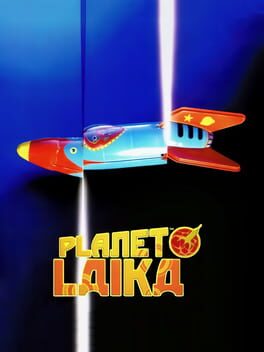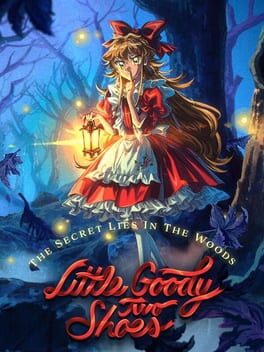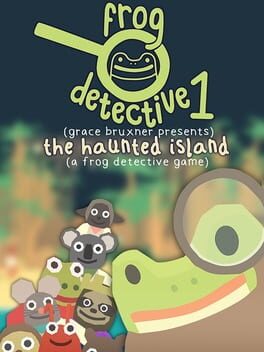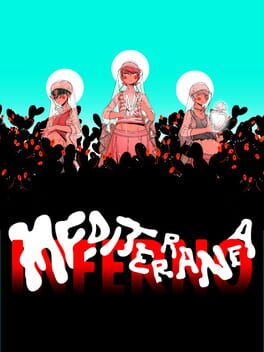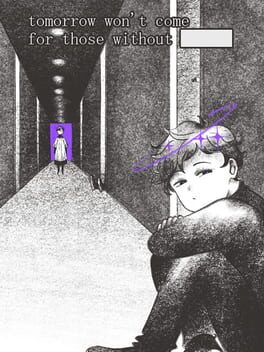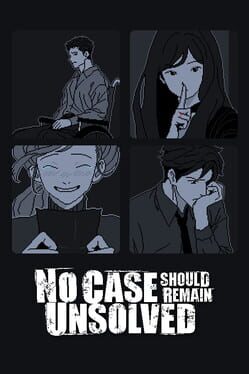01156
BACKER
2022
a melancholic wound which bleeds for the virtue of creativity, unfortunately — ironically — weighed down by the influence of its inspirations so much that it's afraid to be itself. each new callback feels like a shopping list of narrative elements, tropes or imagery utilised with no sense other than "we also enjoyed [media property]"; it stops eliciting a simple eyeroll and crosses into absurdity when symbolism lifted wholesale from other titles is transplanted for extremely pivotal moments or scenes.
to speak to its strengths, Signalis maintains a highly unique visual language and style across 3d and 2d artistic assets as well as its tactile UI and graphic design. the sleek utilitarian replikas vs the rosy warmth of the gestalts is rendered skillfully with a mere pixel monopen, their representative polygonal forms surprisingly expressive in their minimalistic textures and animations. the accompanying score is also something really special, particularly the piano arrangements which command this epic sadness matched by the tale of Elster and her beloved. i only wish so much attention was given to navigating the game itself as it remains a glorified note hunt segmented by barely responsive doors, with combat feeling more a universal frustrating necessity enforced by the label "survival horror" than anything tense or scary.
like a lot of these gorgeously stylised and well-loved indies, i really did want to love Signalis as its themes and genre are among my favourites along with the recommendation from a few good friends. either way i'm glad to have finally played it despite my own average reception and am inspired by its longing viscera and heartache.
to speak to its strengths, Signalis maintains a highly unique visual language and style across 3d and 2d artistic assets as well as its tactile UI and graphic design. the sleek utilitarian replikas vs the rosy warmth of the gestalts is rendered skillfully with a mere pixel monopen, their representative polygonal forms surprisingly expressive in their minimalistic textures and animations. the accompanying score is also something really special, particularly the piano arrangements which command this epic sadness matched by the tale of Elster and her beloved. i only wish so much attention was given to navigating the game itself as it remains a glorified note hunt segmented by barely responsive doors, with combat feeling more a universal frustrating necessity enforced by the label "survival horror" than anything tense or scary.
like a lot of these gorgeously stylised and well-loved indies, i really did want to love Signalis as its themes and genre are among my favourites along with the recommendation from a few good friends. either way i'm glad to have finally played it despite my own average reception and am inspired by its longing viscera and heartache.
2023
as someone with an interest in horror gaming, i follow plenty of horror youtubers and have watched full playthroughs of every Chilla's Art release. they're jank things, speedy turnover reused-asset experiences centered on societal, social, and even supernatural incidents grounded in Japanese culture, but things i always generally enjoyed for some aspect or another. i found Chilla's prior release Night Security actually pretty unique and enjoyable even if just as a viewer, and decided i might actually play the studio's next game myself for once.
Parasocial taught me why i prefer to watch these releases rather than play them myself. there's some immediately interesting concepts at play with the streaming interface, as well as the very real terror of being followed i've personally experienced leaving me a bit shaken. however, the crippling technical performance despite receiving feedback in a patron-exclusive beta made the game nearly unplayable in its current state, as well as the cheeky self-references having the opposite effect.
it's upsetting buying games (particularly indies, which i'm almost always willing to forgive) on launch is no longer encouraged as they are often not ready, and while i understand Chilla's is a two-man project, with their catalogue of works, experience, and fervent fan support i expected a smoother landing. the team's repeated history of utilising young women enduring abuse or manipulation as objects of shock horror bad ends is questionable besides, a trend Parasocial maintains.
Parasocial taught me why i prefer to watch these releases rather than play them myself. there's some immediately interesting concepts at play with the streaming interface, as well as the very real terror of being followed i've personally experienced leaving me a bit shaken. however, the crippling technical performance despite receiving feedback in a patron-exclusive beta made the game nearly unplayable in its current state, as well as the cheeky self-references having the opposite effect.
it's upsetting buying games (particularly indies, which i'm almost always willing to forgive) on launch is no longer encouraged as they are often not ready, and while i understand Chilla's is a two-man project, with their catalogue of works, experience, and fervent fan support i expected a smoother landing. the team's repeated history of utilising young women enduring abuse or manipulation as objects of shock horror bad ends is questionable besides, a trend Parasocial maintains.
as of late following a friend finishing Skyward Sword for me over discord, brainworms have been revitalised regarding the Zelda franchise and i'm finding myself in a fixated race to play entries i can get my hands on. like others i was a kid who didn't have many opportunities to buy new games and would often replay the ones i did own to absolute mind-numbing ultradeath, with my usual suspect being Phantom Hourglass for the DS. along with The Sims 2 for PSP it was one of my first experiences with the Tetris Effect and i harbour a lot of nostalgia for this sequel to a game i had never even heard of, and in 2024 i'm visiting another in A Link Between Worlds.
i was an impatient and petty-minded teen when i was taught emulation by my brother and quickly grew frustrated with A Link to the Past for entirely minor reasons (2d, grid based movement and combat, the dark world confused me, link's hair was purple (seriously?)). i couldn't believe this was the same series as the toon link i knew and loved and promptly discarded it after trying to restart any interest in it over and over, my favourite Zelda song ironically being the Hyrule Castle theme; probably due to my repeated experiences of the game's prologue.
it's this background that has me feeling guilty about how much i adored ALBW. featuring 1:1 cast members of its predecessor, a light/dark world transition, a new creative gimmick in the wall merge, and an incredible supporting character found in Ravio, what i see many refer to as the best 2d Zelda game delighted me over the few days i spent playing through it. coming from my background of PH and now SS, ALBW boasts snappy and engaging puzzle design in comparison within and without the dungeons spotting the kingdom with a sprinkling of platforming, highlighted within Death Mountain. on top of it all, the wall merge remains thrilling all the way to the very last second of gameplay, its use within the final boss encounter cementing ALBW's grasp on Zelda as a whole.
the score, art direction, overall worldfeel, dungeon design, and the narrative of manipulation vs ultimate charity is enchanting. it was just such a sweet experience, shoutout to Skull Woods and the Thieves' Hideout.
i was an impatient and petty-minded teen when i was taught emulation by my brother and quickly grew frustrated with A Link to the Past for entirely minor reasons (2d, grid based movement and combat, the dark world confused me, link's hair was purple (seriously?)). i couldn't believe this was the same series as the toon link i knew and loved and promptly discarded it after trying to restart any interest in it over and over, my favourite Zelda song ironically being the Hyrule Castle theme; probably due to my repeated experiences of the game's prologue.
it's this background that has me feeling guilty about how much i adored ALBW. featuring 1:1 cast members of its predecessor, a light/dark world transition, a new creative gimmick in the wall merge, and an incredible supporting character found in Ravio, what i see many refer to as the best 2d Zelda game delighted me over the few days i spent playing through it. coming from my background of PH and now SS, ALBW boasts snappy and engaging puzzle design in comparison within and without the dungeons spotting the kingdom with a sprinkling of platforming, highlighted within Death Mountain. on top of it all, the wall merge remains thrilling all the way to the very last second of gameplay, its use within the final boss encounter cementing ALBW's grasp on Zelda as a whole.
the score, art direction, overall worldfeel, dungeon design, and the narrative of manipulation vs ultimate charity is enchanting. it was just such a sweet experience, shoutout to Skull Woods and the Thieves' Hideout.
1999
Planet Laika has inspired lofty trains of thought this past week regarding the transient nature of daily life, the miraculous circumstances that lead to a pair of people meeting each other, and how easily trauma can take away everything from you. while the vehicle it chooses is as fantastical as "dog people in space", between the nonsensical eccentricities of Mars' colony dwellers are heart-stopping moments of clarity through which Laika communicates its core ethos.
while there is no regaining lost time, you are not a slave to the events which brought you here today. while there might exist a darkness in you that cannot be illuminated, living alongside it and accepting it is possible. you are not leaves that fall at autumn's beckon. you must will yourself to fall.
look, it's snowing. merry christmas.
while there is no regaining lost time, you are not a slave to the events which brought you here today. while there might exist a darkness in you that cannot be illuminated, living alongside it and accepting it is possible. you are not leaves that fall at autumn's beckon. you must will yourself to fall.
look, it's snowing. merry christmas.
i don't think i liked it :(
a richly illustrated nightmare fairy tale which warns of paranoid infighting and reaching for an unattainable ideal, broken apart by tedious and artificially difficult survival horror segments. i meet each hazard as intended and am often punished with unforgiving damage or by being taken to an instant game over, and while i fully accept that this very well might just be a skill issue on my part, it remains a significant hurdle that's barring me from engaging properly with the unfolding narrative.
i'm not unfamiliar with the death-laden rpgmaker horror-esque titles which preceded LGTS and those it draws its inspirations from, its how it contextualises such flaws that becomes an issue. there are no "skip seen dialogue" options, with the fast forward made available to us after Elise's delayed inputs just slow enough to be annoying. on that note, bosses with instant death attacks have unskippable cutscenes prior making repeat attempts patronising. two core survival systems are made redundant within one of the in-game days. perhaps most tragically, the distinct visual style which once pleased the eye beings to blend into monotony and goes unappreciated after some hours.
and like i'm sad about it! i wanted to like it! i really enjoyed how the story progressed and how my bond with my favourite lady bloomed and i liked the endings i've managed to get, but all these hiccups had me nearly just uninstalling early. it's a beautiful poetic horror title, but so many little things simply ended up overwhelming me.
a richly illustrated nightmare fairy tale which warns of paranoid infighting and reaching for an unattainable ideal, broken apart by tedious and artificially difficult survival horror segments. i meet each hazard as intended and am often punished with unforgiving damage or by being taken to an instant game over, and while i fully accept that this very well might just be a skill issue on my part, it remains a significant hurdle that's barring me from engaging properly with the unfolding narrative.
i'm not unfamiliar with the death-laden rpgmaker horror-esque titles which preceded LGTS and those it draws its inspirations from, its how it contextualises such flaws that becomes an issue. there are no "skip seen dialogue" options, with the fast forward made available to us after Elise's delayed inputs just slow enough to be annoying. on that note, bosses with instant death attacks have unskippable cutscenes prior making repeat attempts patronising. two core survival systems are made redundant within one of the in-game days. perhaps most tragically, the distinct visual style which once pleased the eye beings to blend into monotony and goes unappreciated after some hours.
and like i'm sad about it! i wanted to like it! i really enjoyed how the story progressed and how my bond with my favourite lady bloomed and i liked the endings i've managed to get, but all these hiccups had me nearly just uninstalling early. it's a beautiful poetic horror title, but so many little things simply ended up overwhelming me.
2023
2024
Chock full of all the growing pains and nagging annoyances of both the title that preceded it as well as that of the open world genre at large, DDII offers a satisfying moment to moment exploration experience and a fulfilling conclusion only earnt after a poorly structured main story quest. Familiar narrative elements line your path like markers illuminating the way forward as this title exists as a simultaneous remake and sequel; there is a Dragon who threatens a far away kingdom, there is an Arisen who must rise to His challenge, and there is a Pawn conjured of pure thought at their side, all as the infernal chain demands of this world. The unique roleplaying capabilities the Arisen storytelling model provides remains a captivating experience just as it did in the first entry, further explored with the underdog nature of this iteration's Arisen and their place of weakness as a victim of stolen valour, and once again the dynamic between master and Pawn invite many interpretations to the nature of their relationship beyond surface level character customisations available ingame.
A reader would note I place a lot of bearing on the narrative of the Dogma titles and it's because I see it as their strength, there's little I can constructively say about the vocation-based combat that hasn't already been said by those better written than I. Of course all games which allow character customisation to some capacity leave wriggle room for roleplay on the player's part, to explore regarding individual reactions to events and splinter canons or endings, and the Arisen/Pawn dynamic illustrates this potential stronger than other titles. It is purely because of DD's vagueities and space between major quests (especially utilising the breathing room of methodical travel) that allows one to fill in their own blanks and organically develop characteristics through gameplay.
I acknowledge mine is a special case as my sentimental tie to DD extends beyond mere rose tinted glasses or nostalgia. My family was homeless and hotel/sharehouse-hopping for an extended length of time during my teenage formative years, a period hazy even to myself as I still underestimate its effects on my current personhood and mental condition. It was a special and difficult circumstance in which my brother and I kept our heads down while my mother worked the hardest years in her life, and the video games I had the opportunity to play during this period endure as those closest to me: NieR, Xenoblade Chronicles, and Dragon's Dogma. The destined heroism of the Arisen and having their fate so clearly etched into the very order of reality proved an escape from my own unmoored existence, kicking off the most artistically inspired years of my time drawing and seeing the creation of numerous individual original characters all brought to life from the same narrative device, their scribbled intricacies lost to sketchbooks long gone. DD was so much more than just a jank open world game to me then, it was where I first explored my own transgenderism without a prior outlet and where I could receive acknowledgement of my being alive from strangers across the Pawn network. I was here and existed, and I could aid others even if in an insignificant way.
I've yet to see a similar burst of unabashed creativity following this period not even seen during my exploration of FFXIV character development, and while DDII couldn't possibly foster a child's productivity in me, I feel the inkling of potential within once again. Yeah that one Nadinia quest bothered me, yes the pacing felt really off at times, yes the loss gauge is abysmally unfair, but it's more Dragon's Dogma. How could I not love it? Thank you to my partner for allowing me to use his PC with far better specifications than mine.
A reader would note I place a lot of bearing on the narrative of the Dogma titles and it's because I see it as their strength, there's little I can constructively say about the vocation-based combat that hasn't already been said by those better written than I. Of course all games which allow character customisation to some capacity leave wriggle room for roleplay on the player's part, to explore regarding individual reactions to events and splinter canons or endings, and the Arisen/Pawn dynamic illustrates this potential stronger than other titles. It is purely because of DD's vagueities and space between major quests (especially utilising the breathing room of methodical travel) that allows one to fill in their own blanks and organically develop characteristics through gameplay.
I acknowledge mine is a special case as my sentimental tie to DD extends beyond mere rose tinted glasses or nostalgia. My family was homeless and hotel/sharehouse-hopping for an extended length of time during my teenage formative years, a period hazy even to myself as I still underestimate its effects on my current personhood and mental condition. It was a special and difficult circumstance in which my brother and I kept our heads down while my mother worked the hardest years in her life, and the video games I had the opportunity to play during this period endure as those closest to me: NieR, Xenoblade Chronicles, and Dragon's Dogma. The destined heroism of the Arisen and having their fate so clearly etched into the very order of reality proved an escape from my own unmoored existence, kicking off the most artistically inspired years of my time drawing and seeing the creation of numerous individual original characters all brought to life from the same narrative device, their scribbled intricacies lost to sketchbooks long gone. DD was so much more than just a jank open world game to me then, it was where I first explored my own transgenderism without a prior outlet and where I could receive acknowledgement of my being alive from strangers across the Pawn network. I was here and existed, and I could aid others even if in an insignificant way.
I've yet to see a similar burst of unabashed creativity following this period not even seen during my exploration of FFXIV character development, and while DDII couldn't possibly foster a child's productivity in me, I feel the inkling of potential within once again. Yeah that one Nadinia quest bothered me, yes the pacing felt really off at times, yes the loss gauge is abysmally unfair, but it's more Dragon's Dogma. How could I not love it? Thank you to my partner for allowing me to use his PC with far better specifications than mine.
2023
the disclaimer prior to play claiming "exaggerated depictions" does not prepare you for the ham-fisted caricatures within which results in nonsensical social exchanges and a questionable conclusion. while a 6x speed toggle is available upon replay you cannot choose to skip entire mirages, padding attempts for other endings and routes into absolute drudgery and ultimately killing my enjoyment entirely before getting my final third.
its cheeky engagement with sexual and queer imagery turns away and blushes when it comes to actually depicting any genitalia where it would be acceptable to include. every nude doll body is of the exact same proportion and i often struggled to tell Claudio and Andrea apart due to their only visual differences being a slight hair part, something i feel is a massive flaw of the artistic style which personally isn't to my tastes. i'm not desperate for illustrated nudity, i just wish it was genuine about its subject matter.
i also second the criticism that Mediterranea borrows just a bit too much from We Know the Devil, a similar game of social exclusion with its supernatural influence on a circle of friends which realises its narrative far more succinctly. to throw them a rope and say something positive, the way the 2d artwork organically navigates the 3d spaces is impressive and the sheer amount of illustration assets is staggering. there's a strong visual aesthetic sense, the style of the artwork just pairs poorly with it.
"wow cool symbolism!" [gundam shooting overhead] "transfems always dispense the best advice"
its cheeky engagement with sexual and queer imagery turns away and blushes when it comes to actually depicting any genitalia where it would be acceptable to include. every nude doll body is of the exact same proportion and i often struggled to tell Claudio and Andrea apart due to their only visual differences being a slight hair part, something i feel is a massive flaw of the artistic style which personally isn't to my tastes. i'm not desperate for illustrated nudity, i just wish it was genuine about its subject matter.
i also second the criticism that Mediterranea borrows just a bit too much from We Know the Devil, a similar game of social exclusion with its supernatural influence on a circle of friends which realises its narrative far more succinctly. to throw them a rope and say something positive, the way the 2d artwork organically navigates the 3d spaces is impressive and the sheer amount of illustration assets is staggering. there's a strong visual aesthetic sense, the style of the artwork just pairs poorly with it.
"wow cool symbolism!" [gundam shooting overhead] "transfems always dispense the best advice"
i personally harbour no religious ties or guilt whatsoever myself, but tomorrow won't come's portrayal of childhood experiences and how they can shape our futures felt extremely tangible and sharp. religious organisations and hierarchies and how they assert control over the faithful, harmful and avoidant thinking strategies which only result in self-mutilating apathy, the cling to a fading sense of self.
etherane's textured illustrations and simplistic yet expressive characters are wonderfully charming. i enjoyed a few tracks on the score, but the very significant "noise" sound had an awful effect on my tinnitus ass. i also had little patience for a very small segment midway through, and did consult a guide for both this area and obtaining the other, difficult to obtain ending. spending the extra half hour to experience the full story was well worth it however.
etherane's textured illustrations and simplistic yet expressive characters are wonderfully charming. i enjoyed a few tracks on the score, but the very significant "noise" sound had an awful effect on my tinnitus ass. i also had little patience for a very small segment midway through, and did consult a guide for both this area and obtaining the other, difficult to obtain ending. spending the extra half hour to experience the full story was well worth it however.
a mess of miscontextualisation and a plea for kindness within institutions which deprive us, definitely been feeling a bit fragile lately because it had me in tears a few times.
the game demands a certain degree of attention and a slower pace which had me resetting my save early on once i realised i hadn't been giving what it wanted or deserved. i recommend making some notes on paper as you play and progress as it makes for a really authentic deduction experience.
the game demands a certain degree of attention and a slower pace which had me resetting my save early on once i realised i hadn't been giving what it wanted or deserved. i recommend making some notes on paper as you play and progress as it makes for a really authentic deduction experience.
"I am a cute girl and this is happening to me probably for that reason alone."
on transgenderism, desire, something beyond survivor's guilt, visceral delusions and how we believe them. the prose is impressively similar to the thought processes one maintains during a nightmare or breakdown, a burst of base observations spotted with uncontrollable terror. protagonist Marisol is a prisoner to her own memories, haunted by an ultimate betrayal. it's difficult to see the other perspective.
vncup attracts incredible talent once again! i hope to get to other entries once emotionally ready.
on transgenderism, desire, something beyond survivor's guilt, visceral delusions and how we believe them. the prose is impressively similar to the thought processes one maintains during a nightmare or breakdown, a burst of base observations spotted with uncontrollable terror. protagonist Marisol is a prisoner to her own memories, haunted by an ultimate betrayal. it's difficult to see the other perspective.
vncup attracts incredible talent once again! i hope to get to other entries once emotionally ready.
2022
a biblical epic, best experienced with a talented loremaster and guide who can point out significant items and areas.
previously abandoned around year ago on release, i restarted with a fresh face and, more importantly, a kind pair of friends to travel alongside. i've played every "souls" title and i have to say ER has shot to the number one place in my heart alongside sekiro after giving it another chance.
"it's about the rebus, okay? it's about sulfur and mercury."
previously abandoned around year ago on release, i restarted with a fresh face and, more importantly, a kind pair of friends to travel alongside. i've played every "souls" title and i have to say ER has shot to the number one place in my heart alongside sekiro after giving it another chance.
"it's about the rebus, okay? it's about sulfur and mercury."
2022
it's not very often the developers of a game earnestly wish of the player "hope you didn't enjoy it!". i'm shocked to find Presenter Slides™ has such a small presence here on backloggd given its introspective, game-analysis meta nature as a thesis indie available free of charge on steam.
the scope of interest is "abusive game design", or as student developers Mathias and Brin prefer to put it, "counter game design"; audial, visual, emotional, and physical gameplay elements which are directly counteractive to player contentment, which admittedly i've never given much thought aside from surface level sentiments of "Wow This Sucks" as a player myself. these span from eye strain, frustrating control schemes, the breach of taboo topics, busy sound design, or "attrition abuse" (that being requesting the player to do the same thing over and over again).
i learned closely of the above information upon fulfilling the tedious conditions of its unlock, in which Mathias and Brin themselves will present their thesis to you personally across 45 slides the player controls the pace of. it's quite novel and bold to stash their well spoken treatise behind the torturous gameplay they critique and were inspired by. an interesting range of topics are explored across the slides aside from the main focus, citing the concepts of daily video gaming as ritual and the player/game relationship and how they might "bleed" into one another. both of which spoke to me personally as someone who strives to play something at least once a day to log onto this very site, as well as the friendships i've made across the online games i play and pondering the significance of having never known that person unless i played that game!
while i have pedantically divested a lot of the thesis within this review i have intentionally omitted much, as i really do implore you to give Presenter Slides™ a try yourself. as yet another person who someday aspires to produce a game of my own [the crowd boos] i appreciated the window into choices i should absolutely not make.
thank you, and have a good boss fight.
the scope of interest is "abusive game design", or as student developers Mathias and Brin prefer to put it, "counter game design"; audial, visual, emotional, and physical gameplay elements which are directly counteractive to player contentment, which admittedly i've never given much thought aside from surface level sentiments of "Wow This Sucks" as a player myself. these span from eye strain, frustrating control schemes, the breach of taboo topics, busy sound design, or "attrition abuse" (that being requesting the player to do the same thing over and over again).
i learned closely of the above information upon fulfilling the tedious conditions of its unlock, in which Mathias and Brin themselves will present their thesis to you personally across 45 slides the player controls the pace of. it's quite novel and bold to stash their well spoken treatise behind the torturous gameplay they critique and were inspired by. an interesting range of topics are explored across the slides aside from the main focus, citing the concepts of daily video gaming as ritual and the player/game relationship and how they might "bleed" into one another. both of which spoke to me personally as someone who strives to play something at least once a day to log onto this very site, as well as the friendships i've made across the online games i play and pondering the significance of having never known that person unless i played that game!
while i have pedantically divested a lot of the thesis within this review i have intentionally omitted much, as i really do implore you to give Presenter Slides™ a try yourself. as yet another person who someday aspires to produce a game of my own [the crowd boos] i appreciated the window into choices i should absolutely not make.
thank you, and have a good boss fight.

